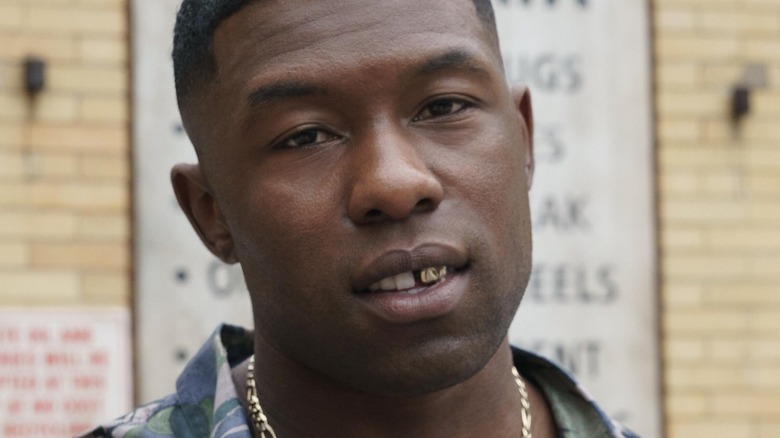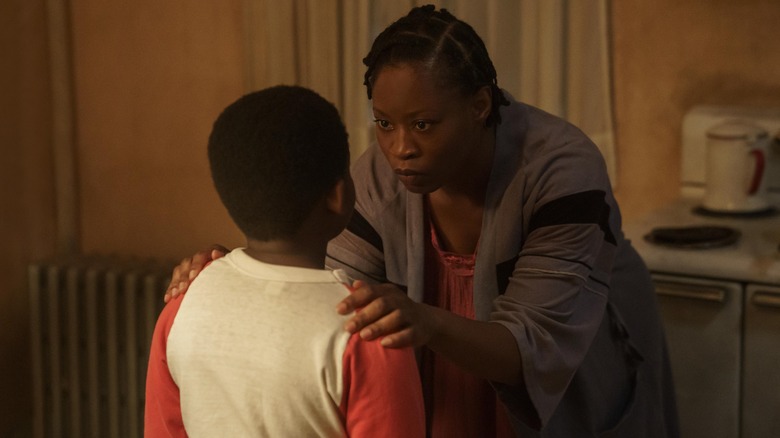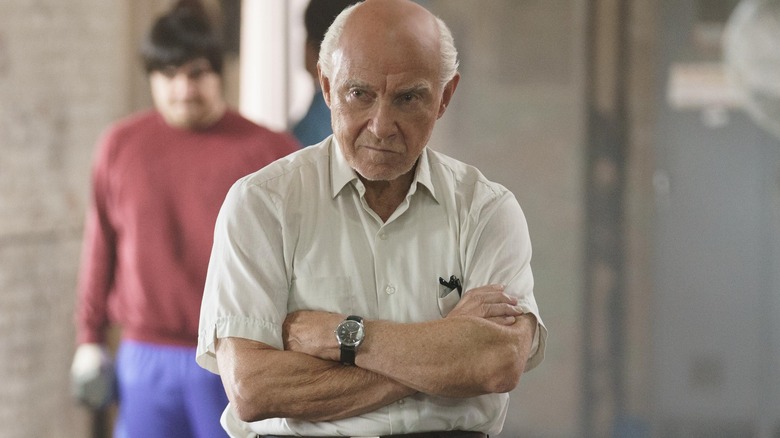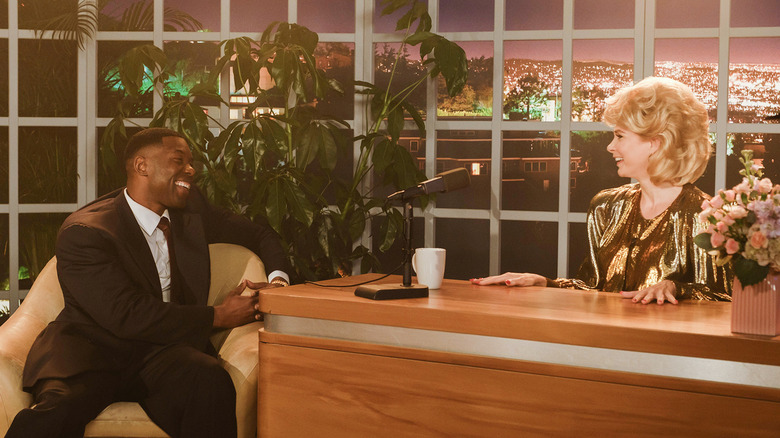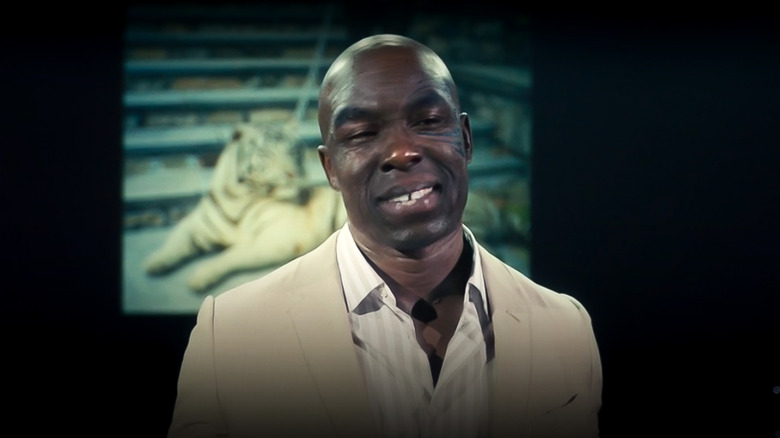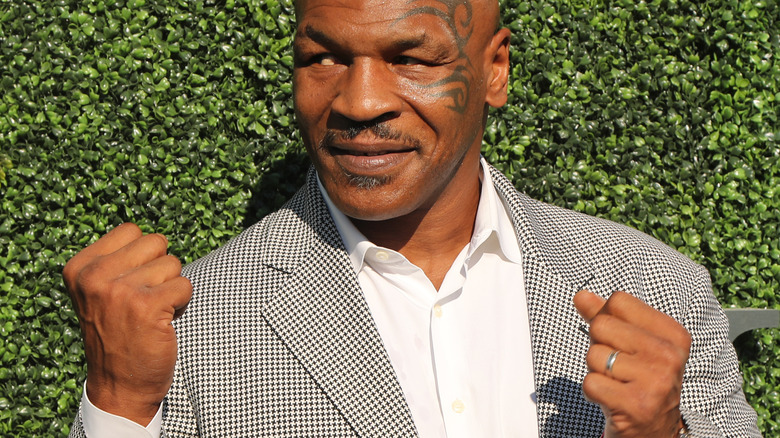Is Hulu's Mike Actually Based On True Events In Mike Tyson's Life?
Contains spoilers for "Mike," Episodes 1 and 2 — "Thief" and "Monster"
For most people, telling their story in film or on television requires plenty of embellishment to make it interesting enough to put on screen. Not so for Mike Tyson. As he lived it, the former boxing champion's life is almost too wild to be believed.
He grew up in the Bedford-Stuyvesant and Brownsville sections of Brooklyn and was headed for a life of petty crime and revolving prison doors when he found boxing. After his mother died when he was 16, Tyson turned pro and went on to dominate the heavyweight division in the late 1980s. In 1992 he was convicted of rape and served three years in prison, but later returned to the ring and made appearances in two "Hangover" movies, his own one-man stage show, and an animated cartoon series, "Mike Tyson's Mysteries."
Tyson has also been the subject of several documentary films and television series, including James Toback's reverent 2008 film "Tyson" and the two-episode 2021 ABC special "Mike Tyson: The Knockout." The latest is an 8-part miniseries from Hulu simply called "Mike," starring Trevante Rhodes as Tyson, Russell Hornsby ("The Hate U Give") as promoter Don King, and Harvey Keitel as trainer Cus D'Amato. But given that Tyson's life story is interesting enough without exaggeration, just how much of "Mike" is true?
If you or anyone you know has been a victim of sexual assault, help is available. Visit the Rape, Abuse & Incest National Network website or contact RAINN's National Helpline at 1-800-656-HOPE (4673).
Tyson's first fight really did come after a bully killed his pigeon
Hulu released the first two episodes of "Mike" on August 25 and the remaining six will be made available on the following six Thursdays. Episode 1, "Thief," and Episode 2, "Monster," focus on his childhood, early arrests for street crimes, and the beginning of his boxing career. Tyson is portrayed as an underconfident and overweight kid who gets his first taste of violence when a neighborhood bully beheads one of his beloved pigeons in front of him. The young Tyson bloodies the bully's face with a flurry of punches before the scene cuts to his 1988 win over Leon Spinks, then back to the young Tyson kneeling over the fallen bully. In a voiceover, he says, "That's when things started to change."
Tyson has mentioned the incident numerous times, including in a 2013 tweet, and at its core, this incident appears to be true: a bully did tear the head off of one of Mike's pigeons and threw blood on him, and their subsequent fight was Tyson's first street brawl. In "Mike," he pummels the bully without absorbing a punch himself, but Tyson told Graham Bensinger in 2016 that the real fight wasn't quite as one-sided. "It's not like I was sensational," Tyson clarified. "I was just flailing away, and I guess I hit him more than he hit me, so I won, I guess."
Cus D'Amato and Camille Ewald really did take in a young Mike Tyson
In Episode 2, "Monster," Tyson's mother Lorna Mae (Olunike Adeliyi) dies of cancer, and the distraught teen is quickly adopted by his trainer, Cus D'Amato (Harvey Keitel), and his, partner Camille Ewald (Grace Zabriskie). Cus tells him, "We're family. The fact that you work so hard, listen, believe in me, it gives me motivation to stay alive. I don't know what I'd do without you. I promise I won't leave until I see you succeed." D'Amato died in November of 1985 and Tyson wouldn't win his first championship belt until a little more than a year later, but the young fighter had won all ten of his fights by knockout and was already well on his way to the success D'Amato predicted when he lost his mentor.
In reality, while Cus and Camille were arguably as influential in Tyson's life as his biological parents, they did not formally adopt him, but did become his legal guardians. According to Newsweek, "D'Amato and Ewald opened their home to socially challenged youths ... D'Amato and Tyson had a particularly close bond, with D'Amato becoming his mentor, trainer, and the strongest father figure in his life." Ewald died in 2001 at age 98.
Tyson has a well-earned reputation for being colorful with the media
Two scenes in "Mike" show colorful incidents involving media interviews, although the two interactions are quite different. In one, he curses out a reporter (Milton L. Crosby) who asks him about his rape conviction, cutting the interview short. In another, he playfully banters with talk show host Joan Rivers (Coley Campany), who asks him if he abstains from sex before fights.
Tyson's interview with Rivers is an almost word-for-word and gesture-for-gesture recreation of the original interview. The 20-year-old Tyson is shy and completely disarming in his ill-fitting suit, taking any potential impact out of his quiet declaration that, "I am one hundred percent confident in myself, and I don't need anyone." The real interview is longer than it's shown in "Mike," but the sections shown are very faithfully reconstructed.
The interaction with Crosby's character has grounds in reality but the circumstances surrounding the incident were changed for "Mike." When Tyson was in Toronto for a performance of his one-man show, "Mike Tyson: The Undisputed Truth," he met with controversial mayor Rob Ford and then appeared on CP24. Host Nathan Downer asked him if he thought Ford's candidacy would be hurt by his meeting with a convicted rapist and Tyson responded with a flurry of curses. Downer was able to momentarily salvage the real interview before setting Tyson off again, whereas in "Mike," the interaction is much quicker and simpler.
Mike Tyson really did buy and sell exotic animals
Early in Episode 1, Tyson is shown on stage talking about a phone call he made from prison to his car dealer where the man tells him he can get exotic animals for Tyson to keep as pets. Tyson then turns to show a photo of himself holding a tiger on a chain before continuing his monologue. While the mention is fleeting, Tyson's reputation for being fond of and surrounded by tigers is widespread and even found its way into the two "Hangover" movies in which he appeared.
In an episode of the "Joe Rogan Experience" podcast, Tyson told Rogan and comedian Tom Segura the story almost exactly as it's shown in "Mike." Tyson said he reacted enthusiastically to the prospect of loading up his exotic cars with dangerous animals and ordered two tiger cubs. He told Rogan and Segura, "Imagine that, man, you'd be in an Aston Martin or a Ferrari having a tiger right next to you?" Tyson eventually sold or gave away his menagerie of dangerous predators, but he has always seemed more comfortable around animals than people.
Tyson is upset that Mike's creators stole his life story
Despite the show's fairly strong adherence to the real happenings in Mike Tyson's life, the former fighter isn't too pleased with "Mike" — although it's not necessarily because he feels like the portrayal is unfair or inaccurate. Rather, he is upset that the show's creators are using his life story as the basis for their project without compensating him. In an Instagram post, Tyson emphatically declared that the series does not have his blessing, and wrote, "Hulu is the streaming version of the slave master. They stole my story and didn't pay me."
Daniel Fienberg, the chief television critic for the Hollywood Reporter, thinks that while the series may represent events faithfully, the picture it paints of Tyson isn't reflective of his life. Fienberg wrote, "Instead of taking us inside Mike Tyson's head — a place none of us might actually want to spend time — 'Mike' takes us further and further from any unmediated truths about Mike Tyson." He does acknowledge that the series is derivative of Tyson's one-man show, but Fienberg thinks that works in Tyson's favor.
"'Mike' isn't some total puff piece," he wrote. "But it's way more invested in trying to understand Mike Tyson and the things he has either admitted to doing or been convicted of doing than in actually depicting those things and letting the audience draw their own conclusions. It's not a big warm hug, but it's definitely a compassionate pat on the shoulder and not a very perceptive one."
